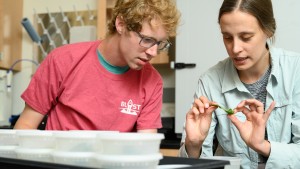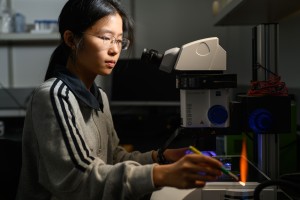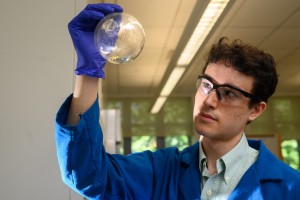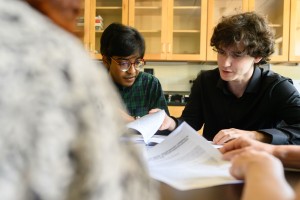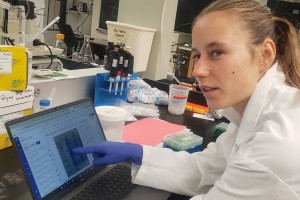Noah Dean ’26 declines a blanket as he sits down on the grass for our interview. He’s very used to this — not being interviewed, but being around insects and grass. He observes plants and bugs most days of the week.
When asked about his favorite bug, he says “fireflies.” It is sunset, and the storm clouds have begun to clear. Fireflies awaken around us. They are not an insect that Dean has been studying, but he understands the importance of even the smallest organisms.
Dean, a double major in environmental studies and English, spent the summer working with Assistant Professor of Environmental Studies Lauren Schmitt as an Environmental Studies Sustainability Scholar. Most weekdays, he could be found in one of three area apple orchards — Branstool Orchards in Utica, Glen Hill Orchards in Mount Vernon, and Apple Hill Orchards in Fredericktown — studying what pests plague them, which predators eat the pests, and how biodiversity among crops can minimize the usage of pesticides and assist farmers.
To do this, he examined dummy caterpillars made from modeling clay that he left on tree branches and documented the bite marks left on the surface by parasitic wasps, spiders and birds. He checked sticky traps for specimens and recorded in data sheets and notebooks what crawled up overhead leaves and branches. He repeated this across the orchards meticulously, going from dead center to where crops end and deciduous forest appears.
“We’re looking at trees at the edges of orchards versus trees on the interior and seeing how those communities are different,” he says. “We’re also doing more mid-scale landscape manipulations by introducing flowers, bringing in potted plants to see if that changes the communities of arthropods present or the strength of their interactions upon each other.”
Noah, a self-described “plant guy” who hails from the suburbs of Detroit, was happy to spend his summer days in the Ohio sun looking for these answers. He has a deep passion for agricultural ecology and environmental studies and aims to help farmers in the local and wider community, as well as the organisms that call orchards home.
Dean speaks about the insects he studies as if recalling an old friend, describing the ants that climb on tree limbs and the spiders that spin webs against the sunlight. These often-overlooked creatures are key players in keeping agricultural ecosystems healthy, especially in orchards that only grow a single crop. “I think that so much of the ecological community that underpins the whole environment operates at levels that often gets overlooked,” he says.
Dean explains that monocultures, like orchards, which lack floral diversity, are tough for animals to inhabit, and prone to pest devastation. The more complex an ecosystem is, the more likely it is to adapt and survive.
This is why the plants Dean introduced — and his attention to diversity along the edge of the forestline — is so crucial. He hopes that the work he does will benefit everything around him, from the farmers all the way down to the fireflies that glow around us, and, hopefully, are glowing at the apple orchards, too.
This article was written by Dylan Gibson ’27 as part of the Hoskins Frame Summer Science Writing Scholars program.
